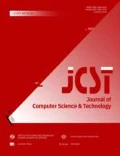Abstract
In the past, expert systems exploited mainly the EMYCIN model and the PROSPECTOR model to deal with uncertainties. In other words, a lot of stand-alone expert systems which use these two models are available. If we can use the Internet to couple them together, their performance will be improved through cooperation. This is because the problem-solving ability of expert systems is greatly improved by the way of cooperation among different expert systems in a distributed expert system. Cooperation between different expert systems with these two heterogeneous uncertain reasoning models is essentially based on the transformations of uncertainties of propositions between these two models. In this paper, we discovered the exactly isomorphic transformations uncertainties between uncertain reasoning models, as used by EMYCIN and PROSPECTOR.
Similar content being viewed by others
References
McDermott J. Making expert systems explicit. InProceedings of the IFIP-86. North Holland Publishing Company, Amsterdam, Dublin, 1986, pp.539–544.
Zhang C, Bell D A. HECODES: a framework for heterogeneous cooperative distributed expert systems.International Journal on Data & Knowledge Engineering, 1991, 6: 251–273.
Melle W Van. A domain-independent system that aids in constructing knowledge-based consultation programs.Ph.D. Dissertation, Report STAN-CS-80-820, Computer Science Department, Stanford University, 1980.
Duda R O, Hart P E, Nilsson N J, Reboh R, Slocum J, Sutherland G. Development of a computer-based consultant for mineral exploration.SRI Report, Stanford Research Institute, Menlo Park, CA, October 1977.
Zhang C. Cooperation under uncertainty in distributed expert systems.Artificial Intelligence, 1992, 56: 21–69.
Zhang C. Heterogeneous transformation of uncertainties of propositions among inexact reasoning models.IEEE Transactions on Knowledge and Data Engineering, 1994, 6(3): 353–360.
Zhang Minjie. Synthesis of solutions in distributed expert systems.Ph.D thesis, the University of New England, Australia, 1995.
Zhang C, Orlowska M. On algebraic structures of inexact reasoning models., InAdvances in Information Systems Research, Lasker G Eet al. (eds.), 1991, pp.58–77.
Shortliffe E H, Buchanan B G. A model of inexact reasoning in medicine.Mathematical Bioscience, 1975, 23: 351–379.
Hájek P. Combining functions for certainty degrees in consulting systems. InInt. J. Man-Machines Studies, 1985, 22:59–76.
Marcus M. Introduction to modern algebra. Marcel Dekker, Inc. 1978.
Zhang C. HECODES: a framework for heterogeneous cooperative distributed expert, systems. InPh.D. thesis, University of Queensland, 1990.
Author information
Authors and Affiliations
Corresponding author
Additional information
ZHANG Chengqi received the B.Sc. degree from Fudan University, Shanghai, China, the M.Sc. degree from Jilin University, Changchun, China, and the Ph.D. degree from the University of Queensland, Brisbane, Australia, all in computer science. Currently. Dr. Zhang is an Associate Professor in the School of Mathematical and Computer Sciences, and a Vice-Dean in the Faculty of the Sciences and Head of Board of Studies in Computer Science at the University of New England, Australia. His research interests have been related to multi-agent systems, distributed artificial intelligence, cooperation under uncertainty, information retrieval, and abductive reasoning. He has been awarded an Australian Research Council Large Grant, an Australian Research Council Small Grant and two UNE Research Grants to continue his research. Prof. Zhang is the author or co-author of over eighty research papers. Seven of these papers have been published in renowned international journals, such as, “Artificial Intelligence” and “IEEE Transactions”. He is also a co-author of one book and a co-editor of four books. He is a member of the Australian National Committee for Artificial Intelligence and Expert Systems, a senior member of the IEEE Computer Society and a member of American Association for Artificial Intelligence (AAAI). He is also an Associate Editor of the editorial board for International Journal of Knowledge and Information Systems (Springer-Verlag). He served as a member of Programme Committees for many international or national conferences, such as PRICAI'94, PRICAI'96, ICMAS'96, ICMAS'98, ICIPS'98, ICCIMA'99, etc.
LUO Xudong received his B.S. degree in mathematics and computer science from Southwest China Normal University in 1985, and his M.S. degree in computer science from Chinese Academy of Sciences in 1993. Currently he is a Ph.D. candidate in the School of Mathematical and Computer Sciences at the University of New England, Australia. His research interest centers around the study of Artificial Intelligence, especially in the area of uncertain reasonings. He (as author or co-author) published one book and near 60 research papers in journals or proceedings so far. Mr.Luo is a member of Australian Computer Society.
Rights and permissions
About this article
Cite this article
Zhang, C., Luo, X. Isomorphic transformations of uncertainties for incorporating EMYCIN-style and PROSPECTOR-style systems into a distributed expert system. J. Comput. Sci. & Technol. 14, 386–392 (1999). https://doi.org/10.1007/BF02948741
Received:
Revised:
Issue Date:
DOI: https://doi.org/10.1007/BF02948741



